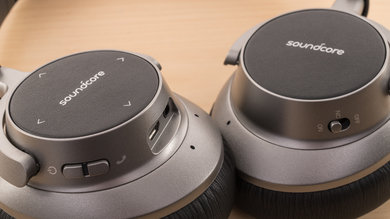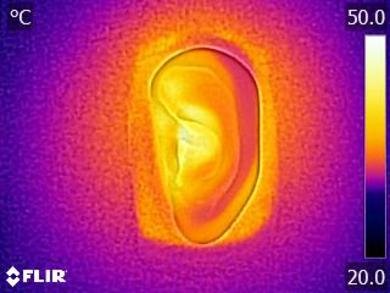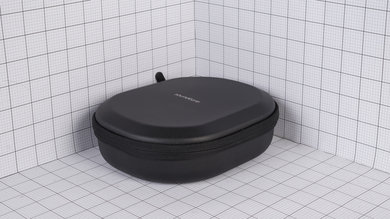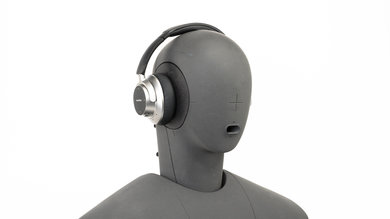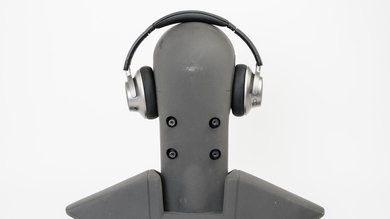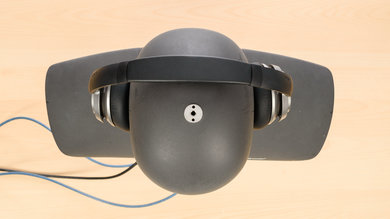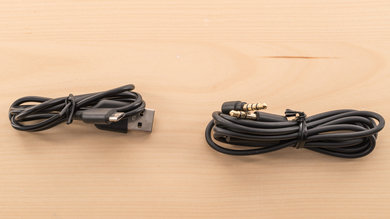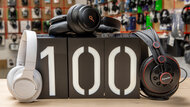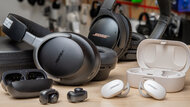The Anker SoundCore Space NC Wireless are over-ear headphones with active noise cancelling. They do an excellent job of blocking out background noise, making them suitable for commuting and office. Unfortunately, they have a dark sound profile, and you should mostly use them for bass-heavy music. On the upside, they're well-built, and their 21-hour battery life should satisfy most users. They also have a nice touch-sensitive control scheme for music and have dedicated buttons for power, calls, and ANC, which are very useful.
Our Verdict
The Anker SoundCore Space NC are fair for mixed usage. These headphones have a thumpy and boomy bass with recessed vocals, better suited for bass-heavy genres rather than a wide variety of music. However, they have an excellent ANC feature that blocks a good amount of background noise, which will be great for commuting and the office. They're decently stable and more breathable than most over-ears, but they still won’t be a good option for sports due to their bulky design. Also, like most Bluetooth headphones, they won’t be ideal for watching TV due to their latency and mediocre microphone.
-
Excellent isolation performance.
-
Comfortable and durable design.
-
No customization options.
The Anker SoundCore Space NC are acceptable for neutral listening. They're more dark-sounding headphones. They have deep and powerful bass, but it's overly thumpy and slightly boomy. Their mid-range is even but recessed, which pushes the vocals and lead instruments to the back of the mix. Also, their treble is underemphasized and lacks detail and brightness. Overall, these headphones are better suited for bass-heavy genres like EDM and hip-hop.
The Anker SoundCore Space NC are decent for commuting. Their ANC feature blocks an excellent amount of low-frequency noises like engine rumble, and you can block even more noise by playing audio. They're comfortable for long listening sessions but aren’t the most portable headphones. Thankfully they come with a great case, and you can easily have them rest around your neck thanks to the rotating cups.
The Anker SoundCore Space NC are okay for sports. They aren’t very portable but should fit inside your gym bag if you decide to use them for this use. They're decently stable, and you can jog with these, but you might sweat a bit more when wearing them. Their dark sound and thumpy bass can be good to keep you pumped during your workouts.
The Anker SoundCore Space NC are decent for the office. They block an excellent amount of ambient speech, especially if you’re playing audio. They don’t leak too much, so you can listen to higher volumes without bothering colleagues surrounding you. Also, their battery life will last you more than a workday, but you can't use these if they're charging. They also don’t connect to multiple devices simultaneously, so you can't switch between your desktop and phone.
The Anker SoundCore Space NC are sub-par for gaming. They have too much latency for gaming, and their microphone recording quality isn’t good enough for online games with friends. However, they come with an audio cable that would get rid of latency, and it also has an in-line microphone that should perform better than the integrated Bluetooth mic.
- 6.8 Mixed Usage
- 6.3 Neutral Sound
- 7.4 Commute/Travel
- 6.9 Sports/Fitness
- 7.1 Office
- 5.1 Wireless Gaming
- 6.8 Wired Gaming
- 6.7 Phone Calls
Changelog
- Updated Feb 14, 2020: Converted to Test Bench 1.4.
- Updated Nov 21, 2019: Converted to Test Bench 1.3.1.
- Updated Nov 21, 2019: Converted to Test Bench 1.3.
- Updated Feb 27, 2019: Review published.
- Updated Feb 25, 2019: Our testers have started testing this product.
Check Price
Compared To Other Headphones
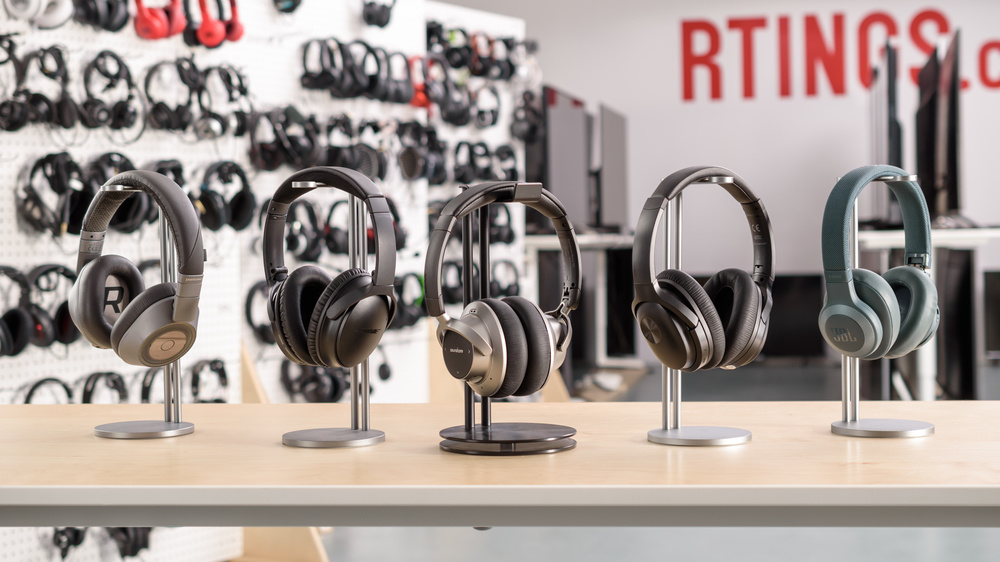
The Anker SoundCore Space NC are decent noise cancelling headphones that set themselves apart by their dark-sounding sound profile. However, they have an excellent isolation performance.
See our recommendations for the best noise cancelling headphones and the best over-ear headphones under $100.
The Anker Soundcore Life Q20 Wireless and the Anker SoundCore Space NC Wireless are decent wireless over-ear headphones with ANC. The Life have a slightly better-balanced sound profile, a much longer battery that charges much quicker, and much lower latency on iOS. The Space have better ANC, feel better built, and have lower latency on Android.
The Plantronics BackBeat Pro 2 Wireless 2016 are better headphones than the Anker SoundCore Space NC Wireless. Both headphones are suited for bass-heavy music, but the Plantronics have better overall audio quality. They also have a great 30-hour battery that only takes two hours to charge fully and can be connected to two devices simultaneously. The Plantronics also support aptX Lower Latency if your source can support it as well. However, their ANC isn’t the best, and the Anker are better in that category, making them a better option for commuting. The Anker also have a better microphone for calls, and their in-line one should be even better.
The Anker SoundCore Space NC Wireless are better headphones than the Cowin SE7 Wireless. The Anker does a good job isolating out background noise, making them more versatile for everyday casual use and especially for commuting. They also have an in-line microphone on their included audio cable, which we expect to perform better than Bluetooth-integrated mics. The Cowin might sound better for some, especially if you don’t use their lackluster ANC feature. The Cowin are also Bluetooth 5.0 compatible, giving you better range and connection stability performance if your source supports it.
The JBL E65BTNC Wireless are better-sounding headphones than the Anker SoundCore Space NC Wireless but don’t isolate noise as well. The JBL sound profile is suitable for many music genres but will still be better suited for bass-heavy genres. You can connect the JBL to two devices simultaneously, and you can use them while charging, which can be very useful at the office. However, the Anker block out more noise, especially in the bass range, making them a better option for commuting.
The Bose QuietComfort 35 II/QC35 II Wireless 2018 are better than the Anker SoundCore Space NC Wireless. The Bose have an excellent design with a very comfortable fit. They have a neutral sound reproduction suited for a wider variety of genres, compared to the Anker's dark and thumpy sound profile. On the other hand, the included TRRS cable for the Anker has an in-line microphone that we expect to perform better than the one integrated into the headphones themselves. The Anker are also less expensive, and fans of bass-heavy music might even prefer them.
The Plantronics BackBeat Go 810 Wireless are better headphones than the Anker SoundCore Space NC Wireless. While the Anker feels better-built and slightly more comfortable, the Plantronics have a great neutral audio reproduction that is versatile for a wide variety of music genres. The Plantronics bass is overdone and will be better suited for bass-heavy genres. The Anker have more than half the Plantronics' latency, and their ANC feature blocks out a great amount of ambient noise. The Anker also come with a nice hard case and an in-line microphone. Critical listeners should go towards the Plantronics, while fans of EDM, hip-hop, and rap who like to listen to music while commuting might feel like the Space NC is a better choice.
The Mpow H10 Wireless and the Anker SoundCore Space NC Wireless are similarly performing headphones, and you may prefer either one. While both headphones have a comfortable fit, the Anker are better built and can isolate you from more ambient noise. The Mpow have a somewhat more neutral sound profile, although it's still very excited, and they have longer continuous battery life.
The Anker SoundCore Life 2 Wireless and the Anker SoundCore Space NC Wireless are very similar headphones in design. However, the main difference between the two is sound. The Life have a more balanced and flat frequency response, while the Space have overemphasized bass and a recessed mid-range, which is better suited for bass-heavy genres. The Life also offer more battery life and take less time to charge, but this may be due to the better noise cancelling performance of the Space. The Space are more versatile since they block a good amount of noise while commuting and at the office.
Video
Test Results
The Anker SoundCore Space NC are great-looking headphones. The back of the ear cups are touch-sensitive surfaces covered by faux leather, which gives them a premium feel and touch. However, the headphones aren’t metal but dense plastic with a shiny metallic finish.
The Anker SoundCore Space NC are comfortable, and you can wear these for a while before feeling any ear fatigue. The headband and the ear cups have thick padding, which is stiff but should soften up with time. The headphones are fairly lightweight and apply good pressure on your head. They might be a bit too tight for people with larger heads, and the cups might be a bit small for larger ears.
The Anker SoundCore Space NC have touch-sensitive controls on the right ear cup and some additional physical buttons. You get play/pause, volume control, and track skipping on the touch-sensitive surface. You can manage calls using the dedicated call butter and access your device’s voice assistant by holding this button. There's a noise cancelling switch so that you can toggle between ANC on or off.
For the volume, you can swipe up or down and keep your finger on the surface at the end of the movement to register the same command again. This means you can go from no volume to max volume with a single swipe. The physical buttons offer great feedback, but you might cover the LED indicator when powering on/off the headphones. Also, you have to be slow and precise with the touch-sensitive area. A quick press or swipe won’t necessarily register, so be sure to put enough pressure on the pad.
Like most over-ears, the Anker SoundCore Space NC aren't the most breathable headphones. They trap heat under the ear cups, and some may feel a difference in temperature after a long listening session. These won't be a good option for working out since you may sweat a bit more than usual.
Like most over-ears, the Anker SoundCore Space NC aren't very portable headphones. However, their cups swivel, making it easy to slide inside a bag or wear around your neck. Also, they fold into a more compact format and fit inside their great hard case, which doesn’t add too much bulk.
The Anker SoundCore Space NC's case is great. It is a hard case that protects the headphones well against scratches, water exposure, and impact. The case's interior is molded to fit the headphones perfectly and gets rid of any wiggling room. The headphones lay flat in the case, and the drivers are also protected.
These headphones have a surprisingly good build quality. The ear cups feel dense enough to survive a few accidental drops without breaking, and the headband is mostly metal. Unfortunately, the cups aren’t made of metal and are only plastic with a shiny metallic finish. The headphones' weakest point seems to be the hinges that hold the ear cups, as they feel a bit thinner than the rest of the build.
The Anker SoundCore Space NC are fairly stable headphones due to their good clamping force. You should be able to jog with these, but their bulky design might not be ideal for more intense physical activities. Their lightweight design doesn’t fall off when tilting the head forward or backward, and since they're wireless, you won’t have to worry about a cable getting hooked on something.
The frequency response consistency is very good. They seem to be using their noise cancelling system to check for bass consistency. Therefore, in the bass range, they perform extremely consistently across our five human subjects. In the treble range, they're decently consistent, but not as much as the bass range, showing a maximum deviation of about 6dB under 10kHz. This results in consistent delivery of bass and treble across multiple users and re-seats.
The Anker SoundCore Space NC's bass is mediocre. Their LFE is at 10Hz, which is excellent. However, low-bass is overemphasized by about 9dB, resulting in excess thump and rumble. Mid-bass, responsible for bass guitars and kick drums, is also overemphasized by about 6dB. High-bass, responsible for warmth, will be slightly boomy due to the 2dB overemphasis. If you'd like a less hyped bass but still want to feel the thump and rumble of it, take a look at the Plantronics Backbeat Go 810.
The Anker SoundCore Space NC's mid accuracy is great. The whole range is fairly even but is noticeably overemphasized in the high-mid. While vocals and lead instruments are present and clear in your mixes, they can also sound honky and harsh.
The Anker SoundCore Space NC have mediocre treble performance. The low-treble is overemphasized, resulting in harsh vocals and lead instruments. The mid-treble, in contrast, is underemphasized, so sibilants like cymbals are a bit dull.
Their imaging performance is good. Weighted group delay is at 0.27, which is very good, but the GD graph shows that the response crosses the audibility threshold around 30Hz, but this shouldn’t be too audible. Also, the L/R drivers of our unit were well-matched in frequency and phase response but had a bit of mismatch in amplitude. This is important for the accurate localization and placement of objects (like voice, instruments, and video game effects) in the stereo field. However, these results are only valid for our unit, and yours may perform differently.
The Anker SoundCore Space NC have a poor soundstage. The PRTF graph shows a decent amount of pinna activation. However, the interaction is not accurate, and there's no 10kHz notch present either. This and their closed-back design suggest a soundstage that's perceived to be located inside the listener's head, as opposed to in front of it.
The Anker SoundCore Space NC have an excellent isolation performance. With the ANC enabled, they achieve more than 18dB of isolation in the bass range, which is quite good. This means they can cancel out the rumble of airplane and bus engines to a good degree. In the mid-range, important for blocking out ambient speech, they isolate by 18dB, which is also very good. In the treble range, occupied by sharp sounds like S and Ts and fan noises like A/C systems, they isolate by 36dB, which is good.
The Anker SoundCore Space NC's leakage performance is great. The significant portion of leakage sits between 1kHz and 5kHz, which is a relatively narrow range. This results in a leakage that sounds fuller and more comprehensible than the leakage of in-ears and earbuds, but not as much as open-back headphones. However, the overall level of leakage is not too loud. With the music at 100dB SPL, the leakage at one foot away averages at 33dB SPL and peaks at 50dB SPL, which is just about the noise floor of most offices.
The Anker SoundCore Space NC's integrated mic has a decent recording quality. The LFE of 281Hz results in recorded/transmitted speech that is relatively thin. The HFE of 3.7kHz suggests a speech that lacks detail. Overall, the understandability of speech on this microphone will be decent since it depends on the 500Hz-3kHz range.
The integrated microphone's noise handling performance is mediocre. The mic achieved a speech-to-noise ratio of 14dB, meaning they will have difficulty transmitting clean and noise-free speech, even in moderately loud environments.
The Anker SoundCore Space NC have a decent 21-hour rechargeable battery life but takes about three hours to charge fully. We couldn’t find the real advertised battery life since Anker shows 12hrs, 20hrs, and 25hrs on the product page and specs sheet. They also say you can get 50 hours of continuous playback if you use the ANC feature when the headphones are wired, but we couldn’t confirm this. You can use the headphones with an audio cable, even when the battery is dead. However, when you plug the audio cable, be sure to turn off ANC if you want to save battery life, as the headphones will automatically be turned on and use the ANC feature. If you're charging the headphones and plug in the audio cable, you’ll have passive playback; however, as soon as you connect the cable, they stop charging.
The Anker SoundCore Space NC doesn’t have an application to enhance your listening experience with customization options.
These headphones are Bluetooth compatible but don’t support NFC for quick and easy pairing, and they can’t be connected to two devices simultaneously, which would have been useful at the office to switch between your phone and work computer. Unfortunately, they aren't Bluetooth 5.0 headphones.
These headphones have somewhat high latency on PC and iOS, meaning that you may experience some delay between your audio and visuals. While they have much lower latency on Android devices, some devices and apps offer compensation, so your real-life experience may vary.
You can use the headphones with the included 1/8” TRRS audio cable. It also has an in-line microphone that's supported by PCs and consoles. You can also use them passively even if the battery is dead. If there’s still power, you can use the ANC feature while being wired too. If your ANC switch is on when you plug the audio cable, the headphones automatically turn on.
These headphones don't have a base/dock. If you’re looking for headphones with one, we suggest the SteelSeries Arctis Pro Wireless.
Comments
Anker SoundCore Space NC Wireless: Main Discussion
Let us know why you want us to review the product here, or encourage others to vote for this product.




